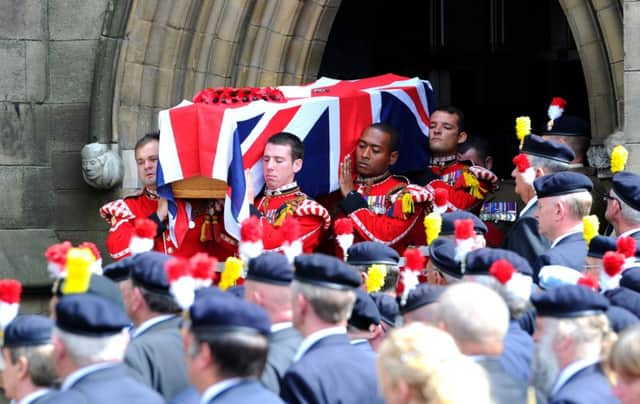Leaders: Crackdown on zealots to improve security


If soldiers were more circumspect in their appearance and routines would a target have been denied? Would greater surveillance and an armed presence around barracks remove any threat?
The answer to the questions posed above is: No. The trial, with all its harrowing detail, has rightly appalled the country. Rigby’s murderers remained unrepentant to the end. Adebolajo has never disguised his extremist views and indeed had previously caught the attention of both the Metropolitan Police and the security services. In 2010 he was arrested in Kenya trying to reach Somalia to join al-Shabaab, the group that attacked Nairobi’s Westgate mall shopping centre earlier this year.
Advertisement
Hide AdAdvertisement
Hide AdHowever, there was no evidence he was planning any attacks. And considering the particulars of the case, there was little, either about the movements of the two men or their appearance, that gave rise to suspicion. What might 24-hour surveillance have yielded on this occasion? The murder weapons involved a nondescript car, a rusty non-firing pistol hidden from view until the attack was underway, a machete and a knife.
Almost as horrific as the attack was the virulence of the hatred pronounced by Adebowale and his evident determination to leave no doubt that this was a deliberate attack, fuelled by his macabre and twisted beliefs.
This in itself is a clear pointer to where tighter security precautions must surely lie. Of course there is a strong case for soldiers to vary their routines with precautions similar to those deployed at the height of the IRA assaults on the UK mainland. Great caution should be used in wearing uniforms outside of barracks, together with baggage and other items which may indicate membership of the armed forces. But such precautions can only be of limited value in the face of political and religious extremists .
This appalling murder reinforces the need for a more intensive focus on the radicalisation of young men – the purveyors of hate and the physical centres where these murderous doctrines are preached. Given this country’s long-standing commitment to civil liberties it is not at all easy to legislate for tighter security when this would of necessity involve greater surveillance of many who are entirely innocent. But a firmer clampdown is needed on those who preach and spread the doctrines of hatred, together with a speedier process of extradition. All this, as the European Court of Human Rights has amply demonstrated – is fraught with difficulty. But a country that identifies preventative action against such horrific crimes as the murder of an off-duty soldier in broad daylight needs to be able to take reasonable action.
Right to deny these criminals a vote
Would a vote for independence in the referendum potentially result in Scotland leaving the European Union? This was the issue with which Lord Glennie wrestled in deciding whether murderers could vote. Many can think of better reasons for maintaining the ban on prisoners voting: when people put themselves outside of society by acts of crime, they forfeit rights. Voting in a referendum is one of them.
The ban on convicted inmates voting next year was challenged by Andrew Gillon and Leslie Moohan, both currently serving life sentences for murder, together with another long-term prisoner. None is due for release until after the referendum date.
The trio claimed that the blanket ban on convicted prisoners was unlawful and incompatible with their rights under the European Convention on Human Rights (ECHR). They also challenged the decision to exclude them from the franchise on the basis of constitutional rights such as the rule of law, the right to vote and respect for international obligations. The ECHR has previously held that a blanket ban on prisoners voting is unlawful following a case brought by axe killer John Hirst. But Lord Glennie ruled there is no direct link between the independence referendum and any decision as to future membership or citizenship of the EU.
By way of aide memoire, Gillon was ordered to serve a minimum 12 years for the murder of Gary Johnstone, who suffered repeated blows to the head from a spade. Moohan was jailed for a minimum 15 years in 2008 after murdering father-of-two David Redpath at a hostel in Edinburgh. Should they get a say in the running of the country?